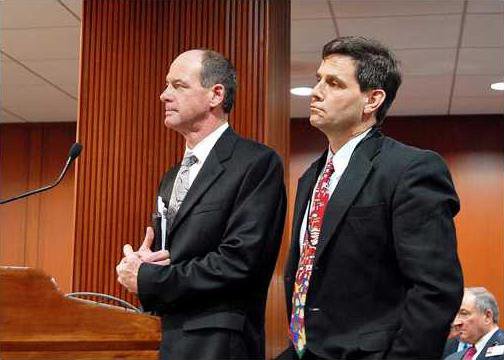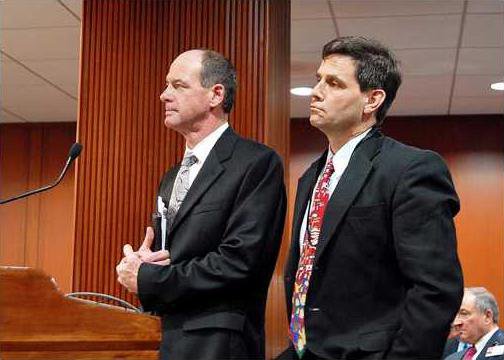ATLANTA — Georgia needs a single vision of education.
That's what Hall County Schools Superintendent Will Schofield told the state House and Senate education committees during a joint meeting Tuesday.
Schofield was one of several school system officials from across the state who addressed the committees as part of a presentation on a "Vision for Public Education in Georgia."
"I believe we stand at a rare opportunity in the state of Georgia and in this nation to see a renaissance, to see innovation, to see children that actually can connect the dots between what we're asking them to do ... and what they want to do with the rest of their lives," he said.
"Given the opportunity, given the proper support, given your backing, I'm convinced that public schools in this state can do all that is possible to serve the needs of our boys and girls."
The vision project is a partnership of the Georgia School Boards Association and the Georgia School Superintendents Association.
The project's team, Schofield said, included 15 superintendents and 15 education board members from 25 different school districts.
Together, they said they have spent more than 15,000 hours over the past two years to create a plan to provide all children with an equitable and excellent education that prepares them for college, career and life.
A big component of creating priorities was feedback from various communities, as well as students.
During Tuesday's meeting, speakers highlighted immediate and long-range steps in different focus areas, including teaching and learning, early education, financial resources and governance, leadership and accountability.
Valarie Wilson, city of Decatur school board member, talked about the importance of early education.
"The first five years are critical," she told the gathering. "Children will not be able to enter school ready to be successful unless families, school districts and communities provide environments and experiences that support physical, social, emotional, language and cognitive development of infants, toddlers and preschool (children)."
Immediate steps to improve early learning include creating public-private partnerships in local communities, and starting an early learning collaborative in every county.
Wilson said the eventual goal is to provide opportunity for all children from birth to age 5 to participate in a full-year educational experience.
Forsyth County School Superintendent Buster Evans talked about embracing the future as a key component to teaching and learning, specifically technology.
But technology will only work, he said, if schools have strong teachers to use it.
"The key to delivering quality education programs are the thousands of teachers who will be able to utilize technology as the leverage to help children," he said.
Along with embracing technology, Evans suggested hiring good educators and offering teacher preparation programs.
Challenging curriculum is also critical, as is the development of a comprehensive and balanced assessment system to gauge where students are in terms of academic performance, he said.
To Evans, the future of Georgia schools will be strong teachers and a combination of classroom and virtual learning opportunities.
"We can expand the school day. We can expand the school year, and we can expand the access to content by leveraging technology," he said.
Diane Sandifer, a former member of the Harris County school board, noted that technology costs money, which is why financial resources are crucial.
Components of the vision project's proposal for the financial future of education include an equitable tax structure, ongoing evaluation of the effectiveness of expenditures and spending money on high-quality educational programs.
"We can't keep balancing our budget by making cuts to education. We simply can't," she said. "A partnership between state and local leaders is paramount in this shared responsibility of funding."
Communities also play a key role, Sandifer said.
Tangible results are also required.
"Our citizens' commitment to support taxation for public schools is enhanced when public education is seen as an essential factor in economic development, a democratic society and quality of life," she said.
House Education Committee Chairman Brooks Coleman appeared receptive to the vision team's ideas. He said along with the governor and Senate chairman, he's committed to education.
Meetings like the one Tuesday are "when you ask a lot of these questions and decide what the legislation needs to be," he said.
"As you said to me, many of you, it's not more legislation necessarily we need," Coleman said.
"Maybe it's the absence of some legislation that we need.
"...Maybe we need to be trusted a little bit more. So maybe that's it."



